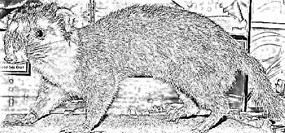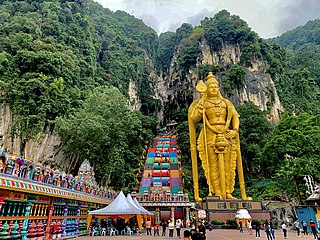
Taman Negara is a national park in Peninsular Malaysia. It was established in 1938 and 1939 as the King George V National Park after Theodore Hubback lobbied the sultans of Pahang, Terengganu and Kelantan to set aside a piece of land that covers the three states for the creation of a protected area. After independence, it was renamed Taman Negara, which means "national park" in Malay.

Sabah Parks is a conservation-based statutory body established in 1964 with the purpose of conserving the scenic, scientific and historic heritage of the state of Sabah, Malaysia, on the island of Borneo. The organisation is also responsible for the management and promotion of the various protected reserves in Sabah, in particular those designated as national parks. It is also mandated to develop tourism-friendly facilities to accommodate tourist arrivals to these reserves and ensure that the state of the reserves is not compromised. The first choice for inclusion in a park system was Mount Kinabalu. As a result, Kinabalu Park was gazetted in 1964, and today it is designated as a World Heritage Site.

The Bornean ferret badger, also known as Everett's ferret badger or the Kinabalu ferret badger, is a small, nocturnal and omnivorous mammal that is endemic to the island of Borneo. It is a member of the family Mustelidae and is one of six species of the genus Melogale. It is listed as endangered on the IUCN Red List of Threatened Species due to its small distribution range, which includes Kinabalu National Park and Crocker Range National Park.

The Department of Wildlife and National Parks of Peninsular Malaysia, abbreviated PERHILITAN, is a governmental organisation that is responsible for the protection, management and preservation of wildlife and national parks in Peninsular Malaysia.

This article lists important figures and events in Malayan and Malaysian public affairs during the year 1963, together with births and deaths of significant Malaysians. The Federation of Malaya merged with Singapore, North Borneo, and Sarawak to form the Federation of Malaysia on 16 September.

Tourism in Malaysia is a major industry and contributor to the Malaysian economy. Malaysia was once ranked 9th in the world for tourist arrivals. In 2017, the Travel and Tourism Competitiveness Report ranked Malaysia 26 out of 141 countries using its Travel & Tourism Competitiveness Index (TTCI) which measures the various components and policies of a country that are in place to allow for the sustainable development of its travel and tourism sectors.

Muhammad Fuad Stephens, was a Malaysian politician who served as the 1st and 5th Chief Minister of Sabah from September 1963 to December 1964 and again briefly from April 1976 to his death in June 1976, 3rd Yang di-Pertua Negara of Sabah from September 1973 to July 1975, 6th High Commissioner of Malaysia to Australia from 1968 to 1973. In addition, he also served as the 1st Huguan Siou or Paramount Leader of the Kadazandusun community. He played a role in bringing Sabah into the Federation of Malaysia in 1963. While he was initially against the idea of Sabah joining in the Federation, given British concerns about the stability of the region and their move to relinquish all their colonies in the post WWII era, he was gradually convinced to work towards it. He held the chief minister's post from 16 September 1963 until 31 December 1964 when he was forced to resign; and again in 1976 for 54 days from 15 April.

The National Parks Act 1980 is a Malaysian federal law that governs the creation and the maintenance national parks in Malaysia. It was created in 1980 during the controversy surrounding the protection of Endau Rompin forest complex. The act provides for the states to establish national parks to be administered by Department of Wildlife and National Parks under the federal government.
Sabah Wildlife Department, a local wildlife authority under Sabah's state Ministry for Tourism Development, Environment, Science and Technology, enforces the "Wildlife Conservation Enactment 1997" for the proper regulation, use, protection, conservation and management of wildlife, caves and wildlife areas in Sabah. Headquartered in Kota Kinabalu, Malaysia, jurisdiction is spread amongst district offices:

The Malaysian Bar is a professional body which regulates the profession of lawyers in peninsular Malaysia. In Malaysia, there is no distinction between a barrister and a solicitor, in that, it is a fused profession. Membership into the Bar is automatic and mandatory. The bar was created under the Legal Profession Act 1976. Like other bar associations around the world, it has a wide range of functions, including, to protect the reputation of the legal profession, to uphold the cause of justice, to express its views on matters relating to legislations, and others.

The Royal Malaysian Customs Department ; is a government department body under the Ministry of Finance. RMCD functions as the country's main indirect tax collector, facilitating trade and enforcing laws.

The environment of Malaysia is the biotas and geologies that constitute the natural environment of Malaysia. Malaysia's ecology is megadiverse, with a biodiverse range of flora and fauna found in various ecoregions throughout the country. Tropical rainforests encompass between 59% and 70% of Malaysia's total land area, of which 11.6% is pristine. Malaysia has the world's fifth largest mangrove area, which totals over a half a million hectares.

Rahah binti Mohamed Noah was the wife of the second Malaysian Prime Minister Tun Abdul Razak Hussein (1922–1976) and the mother of sixth Prime Minister Najib Razak. She was the daughter of Mohamed Noah Omar (1898–1991), who was the first Speaker of the Dewan Rakyat and also third President of the Dewan Negara.

The Prime Minister's Department is a federal government ministry in Malaysia. Its objective is "determining the services of all divisions are implemented according to policy, legislation / regulations and current guidelines". It is headed by the Prime Minister of Malaysia followed by other Minister in the Prime Minister's Department. The Department consists of the Prime Minister's Office, the Deputy Prime Minister's Office and more than 50 other government agencies and entities. The Prime Minister's Department was established in July 1957. Its headquarters are in Perdana Putra, Putrajaya.
The Department of Orang Asli Development, abbreviated JAKOA, is the Malaysian government agency entrusted to oversee the affairs of the Orang Asli. This body is under the Malaysian Ministry of Rural and Regional Development and was first set up in 1954.

Sakaran Mohd Hashim bin Dandai was a Malaysian politician.

The Sugut River is a river located in the northeastern part of Sabah, Malaysia, between the tripoint of the West Coast, Sandakan as well as a portion of the Kudat division. It has a total length of 178 km from its headwaters in the mountains of northwest Sabah to its outlet at the Sulu Sea, northeastern of Beluran town. Its source is originated from the mountains in the eastern slopes of Mount Kinabalu National Park in Ranau District, which part of the Mount Kinabalu system.
Tan Sri Dato' Seri Mohd Zuki bin Ali is a Malaysian civil servant who served as the 15th Chief Secretary to the Government from 2020 to 2024.
Tan Sri Mohd Bakri bin Omar was an Inspector General of Police who served from 5 November 2003 to 11 September 2006.














